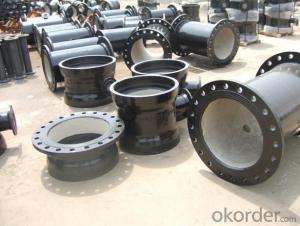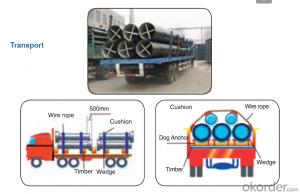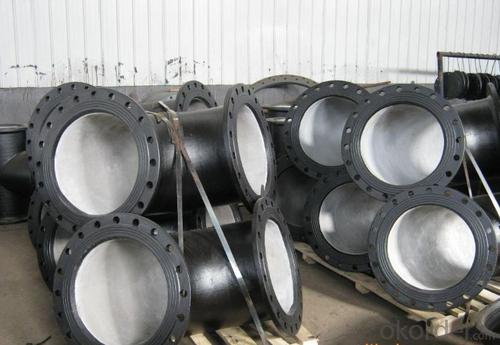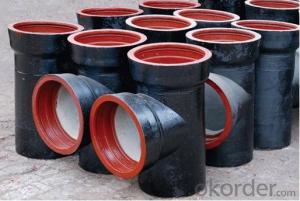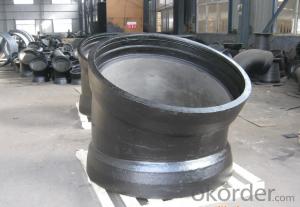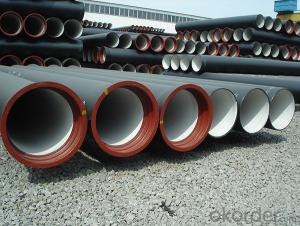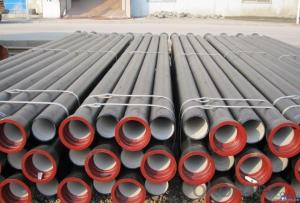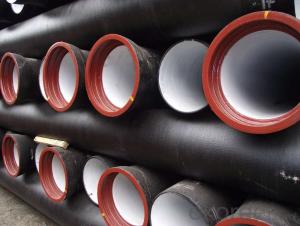Duct Iron Pipe DI Pipe ISO 2531 DN 80-2000mm Push-on Joint T Type
- Loading Port:
- Tianjin
- Payment Terms:
- TT OR LC
- Min Order Qty:
- 100 m
- Supply Capability:
- 100000 m/month
OKorder Service Pledge
OKorder Financial Service
You Might Also Like
Ductile iron pipe fittings:
Dimensions standard:
ISO2531: 50-1000mm, PN10/16
BS4772: 50-1000mm, PN10/16
EN545: 50-1000mm, PN10/16
Connecting mode:
Flanged
Socketed
Mechanical connection
Loose flanged
Coatings:
Inner lined with cement and outside coated with zinc plus bitumen
Inner and outside coated with epoxy resin
Inner and outside coated with fusion bonded epoxy resin
Quality:
ISO 2531 or EN 545 Standard K9 Class, K12 Class
1. ISO 9001 Certificate
2. ISO 2531 & EN 545 Certificate
3. WRAS Potable Water Certificate for FBE Internal Lining
4. WRAS EPDM Rubber Gasket or NBR Rubber Gasket
5. DN80mm - DN2000mm
6. Black Bitumen or Blue FBE / Epoxy Coating
7. Lengh = 6m or cut into 5.6m, 5.7m, 5.8m
8. Client's Brand Customization Allowable
9. Container or Bulk Loading / Shipping
10.Delivery within one Month or According to Client's Order Quantity
11. Support Client or The Third Party Inspection before Shipment
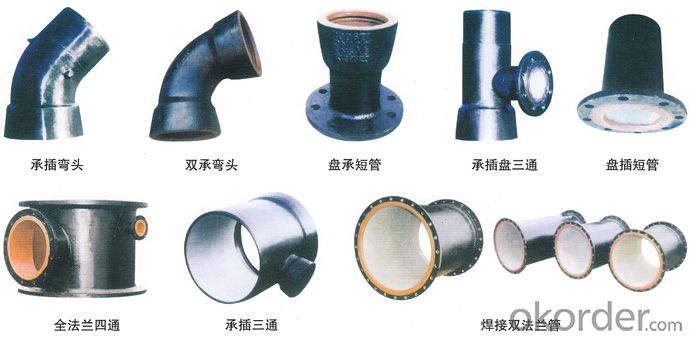
Transport:
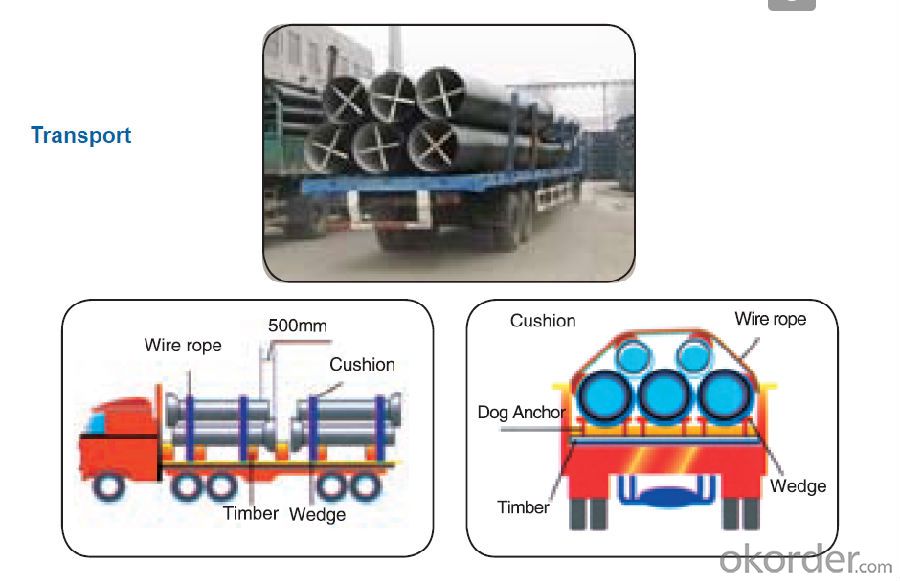
- Q: Can ductile iron pipes be used for underground fuel storage systems?
- Yes, ductile iron pipes can be used for underground fuel storage systems. Ductile iron is a type of cast iron that possesses superior strength, durability, and flexibility compared to traditional cast iron pipes. These properties make ductile iron pipes suitable for various applications, including underground fuel storage systems. Ductile iron pipes are resistant to corrosion, which is essential for underground storage systems that may come into contact with various fuels and chemicals. Additionally, their high tensile strength and resilience allow them to withstand external pressure and loading, ensuring the integrity and safety of the underground storage system. Furthermore, ductile iron pipes have a long lifespan, typically lasting for several decades, making them a cost-effective choice for underground fuel storage systems. They can handle the weight of the stored fuel and any potential ground movements, maintaining the structural integrity of the system over time. However, it is important to note that the suitability of ductile iron pipes for underground fuel storage systems may also depend on other factors, such as local regulations, soil conditions, and the specific fuel being stored. It is always recommended to consult with professionals and adhere to applicable guidelines when designing and installing such systems to ensure compliance and safety.
- Q: What are the differences between ductile cast iron pipes and centrifugal ductile iron pipes?
- Small, thin pipe fittings are usually rolled or continuously cast, and large, thick pipes are usually centrifugally cast. Compared to sand casting, the tissue is compact and homogeneous.
- Q: How do ductile iron pipes perform in acidic soil conditions?
- Ductile iron pipes have a reputation for being durable and resistant to different environmental conditions, including acidic soil conditions. When exposed to acidic soil, these pipes exhibit excellent resistance to corrosion due to their unique composition and protective coating. The high carbon content in ductile iron pipes gives them inherent resistance to corrosion, even in acidic environments. Additionally, these pipes are typically lined with cement mortar or a suitable epoxy coating, which provides an extra layer of protection against acid attack. The combination of the high carbon content and protective coating creates a barrier that prevents direct contact between the acid and the iron, thus minimizing the risk of corrosion. This ensures that the pipes remain structurally sound and maintain their integrity over a long period of time. Furthermore, ductile iron pipes have a long service life and are designed to withstand a wide range of soil conditions. Their strength and flexibility enable them to endure the stresses and strains caused by the surrounding soil, including acidic soil environments. This makes them an ideal choice for applications in soils with higher acidity levels. It is important to note that while ductile iron pipes perform well in acidic soil conditions, the severity and concentration of the acid can affect their performance. In extremely aggressive or highly concentrated acidic environments, additional corrosion protection measures may be necessary, such as sacrificial anodes or cathodic protection systems. In conclusion, ductile iron pipes are highly resilient and excel in acidic soil conditions. Their corrosion resistance, combined with their strong structure and protective coating, ensures their longevity and reliability, making them a preferred choice for various applications in such environments.
- Q: How are ductile iron pipes repaired in case of damage?
- Due to their high durability and strength, ductile iron pipes are commonly utilized in various applications. However, like any other materials, these pipes can sustain damage over time due to external influences or internal corrosion. In such instances, there exist several techniques available for repairing ductile iron pipes. One prevalent method is the trenchless repair technique, which allows for the restoration of the damaged section without the need for extensive excavation. This method typically employs specialized equipment to access and repair the affected area. Its advantages lie in minimizing disruption to the surrounding environment and reducing excavation costs. Another approach for repairing ductile iron pipes involves the application of epoxy lining. This process entails the use of epoxy resin to seal any cracks or leaks on the interior surface of the pipe. Epoxy lining is a cost-efficient and effective solution as it provides long-lasting repairs and enhances the overall condition of the pipe. In cases where the damage is severe or extensive, it may be necessary to replace the damaged section of the ductile iron pipe. This typically involves removing the compromised portion and installing a new pipe section. The replacement process may require excavation and can be more time-consuming and costly compared to other repair methods. Nonetheless, it guarantees a comprehensive and permanent solution for the damaged pipe. It is essential to note that the choice of repair method for ductile iron pipes depends on factors such as the extent of the damage and accessibility. Professional assessment and inspection play a crucial role in determining the most suitable repair technique. Consulting experienced pipeline repair specialists or civil engineers is highly recommended to ensure the most effective and durable repair solution for ductile iron pipes.
- Q: What are the advantages of cast iron pipes?
- The ductile iron pipe with flexible joint construction, convenient operation, can improve the efficiency of construction, improve the construction conditions, reduce the construction cost, and most of the rubber ring connection interface, simple operation, can shorten the construction period, reduce the construction cost.
- Q: Can ductile iron pipes be used in areas with high soil settlement?
- Ductile iron pipes are suitable for areas with high soil settlement due to their strength and durability. They can withstand external loads and ground movement, making them an ideal choice for such areas. Additionally, these pipes have a high resistance to corrosion, making them even more suitable for use in areas with high soil settlement. However, it is important to consider factors such as proper installation techniques, appropriate bedding and backfill materials, and regular maintenance to ensure the longevity and performance of the ductile iron pipes in these areas. Consulting with a qualified engineer or pipe manufacturer can provide more specific guidance based on the site's conditions and requirements.
- Q: What is the difference between ductile iron and cast iron pipes?
- Ductile iron pipes and cast iron pipes are both popular materials for plumbing systems, but they differ in composition, strength, flexibility, installation methods, and cost. 1. Composition: Ductile iron pipes are made from a type of cast iron that has been treated with trace amounts of magnesium, enhancing its flexibility and strength. In contrast, cast iron pipes are made from regular cast iron, which is less malleable and more brittle. 2. Strength: Ductile iron pipes are significantly stronger than cast iron pipes, with higher tensile strength to withstand greater internal and external pressure. This makes them ideal for applications requiring high strength, such as water mains or sewer lines. Cast iron pipes, however, are more prone to cracking or breaking under pressure. 3. Flexibility: Ductile iron pipes have greater flexibility, allowing them to withstand ground movement without damage or breakage caused by settling or shifting soil. On the other hand, cast iron pipes are more susceptible to cracking or separating when exposed to ground movement or vibrations due to their inherent brittleness. 4. Installation: Ductile iron pipes are typically joined using mechanical or flanged joints, ensuring secure and leak-proof connections. In contrast, cast iron pipes are usually joined using bell-and-spigot joints, relying on gaskets or lead caulking for a seal. The mechanical joint used in ductile iron pipes offers better resistance to movement and external forces. 5. Cost: Ductile iron pipes are generally more expensive than cast iron pipes due to the additional treatment process and higher strength. However, the added durability and longer lifespan of ductile iron pipes can offset the initial investment by reducing the need for repairs or replacements over time. In conclusion, ductile iron and cast iron pipes differ in composition, strength, flexibility, installation methods, and cost. Ductile iron pipes offer superior strength and flexibility, making them suitable for demanding applications, while cast iron pipes are more brittle and prone to breakage. The choice between the two depends on the specific requirements of the plumbing system and the available budget.
- Q: Are ductile iron pipes suitable for use in chemical processing plants?
- Yes, ductile iron pipes are suitable for use in chemical processing plants. Ductile iron is a type of cast iron that has enhanced mechanical properties, making it highly resistant to corrosion and suitable for handling various chemicals in industrial settings. It is known for its high tensile strength, durability, and flexibility, allowing it to withstand the high-pressure and temperature conditions often present in chemical processing plants. Additionally, ductile iron pipes have a smooth internal surface, which helps to minimize friction and reduce the risk of flow blockages or contamination. Overall, ductile iron pipes offer a reliable and cost-effective solution for transporting chemicals in chemical processing plants.
- Q: What is the minimum operating temperature for ductile iron pipes?
- Ductile iron pipes typically have a minimum operating temperature of -40 degrees Celsius, showcasing its exceptional strength and ductility in cold conditions. This makes it a versatile option for various purposes, such as water and wastewater systems. Nevertheless, it is crucial to acknowledge that the specific minimum operating temperature may differ based on factors such as the grade of ductile iron employed and the requirements of the application. It is highly advisable to refer to the manufacturer's specifications and guidelines for the appropriate utilization and optimal performance of ductile iron pipes in cold temperatures.
- Q: Are ductile iron pipes resistant to UV radiation?
- Ductile iron pipes do not possess resistance against UV radiation. The exposure to UV radiation can lead to the deterioration and weakening of the material as time goes by. In order to safeguard ductile iron pipes from UV radiation, they must be covered or enveloped with a UV-resistant substance or coated with an appropriate protective layer. Furthermore, it is essential to conduct regular inspections and maintain the pipes adequately to identify and rectify any indications of UV damage.
Send your message to us
Duct Iron Pipe DI Pipe ISO 2531 DN 80-2000mm Push-on Joint T Type
- Loading Port:
- Tianjin
- Payment Terms:
- TT OR LC
- Min Order Qty:
- 100 m
- Supply Capability:
- 100000 m/month
OKorder Service Pledge
OKorder Financial Service
Similar products
Hot products
Hot Searches
Related keywords

